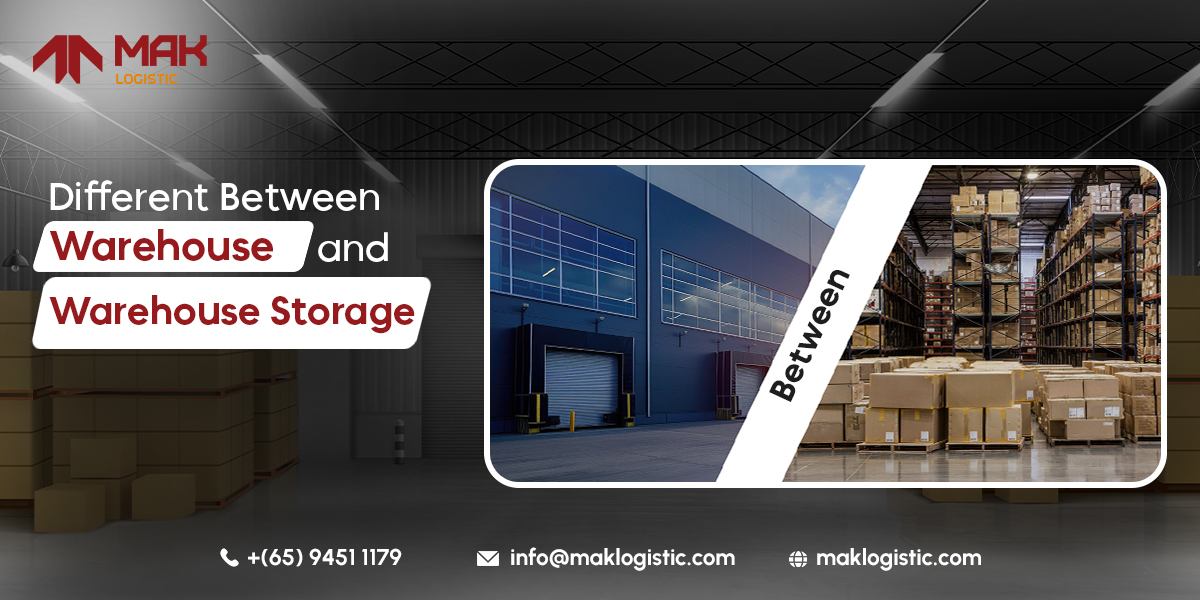
In the logistics business, efficient inventory management is crucial for success. Businesses often rely on warehouses and warehouse storage solutions to manage their stock, ensure timely delivery, and optimize operations. However, many entrepreneurs and business owners confuse warehouses with warehouse storage, assuming they serve the same purpose. While they are related, there are significant differences between the two. Understanding these differences can help businesses make informed decisions, save costs, and improve operational efficiency.
In this blog, we’ll explore the key differences between a warehouse services and warehouse storage, their functions, benefits, and how to choose the right option for your business needs.
What is a Warehouse?
A warehouse is a large facility to store goods, raw materials, and finished products. It serves as a hub for receiving, storing, and distributing inventory efficiently. Warehouses are integral to supply chain management. Warehouses are typically used by manufacturers, wholesalers, and e-commerce companies that handle a high volume of goods. They are equipped with advanced infrastructure, such as forklifts, pallet racks, automated inventory systems, and climate control mechanisms, depending on the type of products stored.
The primary purpose of a warehouse is not just storage but also to support the entire logistics process, including inventory management, order fulfillment, and distribution.
What is Warehouse Storage?
Warehouse storage, on the other hand, refers to the process of storing goods in a warehouse or storage facility without engaging in the full range of warehouse operations. It focuses mainly on the storage aspect, rather than handling complex logistics.
Warehouse storage is ideal for businesses or individuals who need temporary or overflow storage for their products. For example, seasonal businesses may require warehouse storage during peak seasons when their inventory increases significantly. Warehouse storage units are generally more flexible and cost-effective than full-scale warehouses.
Key Differences Between Warehouse and Warehouse Storage
While warehouses and warehouse storage share similarities, they differ in several aspects. Understanding these differences can help businesses select the best option based on their specific needs..,
1. Functionality
Warehouse:
A warehouse is a comprehensive facility that goes beyond simple storage. It handles various operations, including:
Receiving goods from suppliers
Inspecting and sorting inventory
Picking and packing orders
Shipping and distribution
Warehouse Storage:
Warehouse storage focuses solely on storing goods. Minimal handling is involved, and the emphasis is on keeping products safe until they are retrieved or moved to another location.
2. Size and Infrastructure
Warehouse:
Warehouses are typically large facilities with extensive infrastructure to support operations. They may include:
Racking and shelving systems
Material handling equipment such as forklifts and conveyors
Automated inventory management systems
Security and surveillance systems
Warehouse Storage:
Warehouse storage units are generally smaller and more flexible. They can range from a few square feet to large storage bays, depending on requirements. Many storage facilities allow businesses to rent space on a short-term basis, making it an affordable solution for temporary storage needs.
3. Duration of Storage
Warehouse:
Warehouses are designed for long-term storage. Businesses can store their inventory for months or even years while ensuring proper handling, monitoring, and stock rotation.
Warehouse Storage:
Warehouse storage is mostly short-term or temporary. Businesses use it to manage inventory spikes, seasonal demand, or transitional periods without committing to long-term leases.
4. Management and Technology
Warehouse:
Modern warehouses often use Warehouse Management Systems (WMS) to track inventory, manage orders, and optimize storage space. This allows businesses to:
Maintain accurate stock levels
Reduce errors in order fulfillment
Improve operational efficiency
Warehouse Storage:
Warehouse storage facilities typically use simpler tracking methods. Businesses may use basic logs or online tools to monitor inventory, but full-scale automation is generally not involved.
How to Choose the Right Option
Deciding between a warehouse and warehouse storage is an important choice for any business. The right solution can optimize inventory management, reduce costs, and ensure timely delivery of products. Considering these factors allows companies to make an informed decision that supports both short-term needs and long-term business goals.
1. Business Size
The size of your business plays a significant role in determining whether a full-scale warehouse or warehouse storage is the best option.
Large enterprises: Companies with high inventory volume, multiple product lines, and extensive distribution networks benefit more from a warehouse. Warehouses can accommodate large-scale operations, support advanced inventory management systems, and handle high-frequency order processing efficiently.
Small or medium businesses: Smaller businesses or startups may not need the extensive infrastructure of a full-scale warehouse. In these cases, warehouse storage provides a cost-effective solution for keeping products safe and accessible without investing in a large facility.
2. Inventory Volume
The quantity of goods a business needs to store is another major consideration..,
High-volume inventory: Businesses handling thousands of products, such as e-commerce platforms or manufacturers, require a warehouse capable of managing inventory rotation, picking, packing, and shipping. A warehouse ensures that large inventories are systematically organized and easily retrievable.
Low to moderate inventory: Companies with fewer items or seasonal fluctuations may find warehouse storage sufficient. Temporary storage allows them to scale space usage up or down based on demand without paying for unused capacity.
3. Duration of Storage
The length of time your goods will remain in storage influences the decision:
Long-term storage: Warehouses are ideal for businesses that need consistent, long-term storage. They provide structured operations, regular inventory monitoring, and protection against loss or damage over extended periods.
Short-term or seasonal storage: Warehouse storage is perfect for temporary needs, such as storing excess stock during peak seasons, promotional campaigns, or product launches. This flexibility allows businesses to adapt to fluctuating demand without long-term commitments.
4. Budget Considerations
Budget is often a decisive factor when choosing between a warehouse and warehouse storage..,
Warehouses: Operating a warehouse involves higher costs due to rent, staffing, equipment, technology, and utilities. These investments are justified for businesses requiring full-scale logistics services and consistent inventory management.
Warehouse Storage: For businesses with budget constraints or temporary storage needs, warehouse storage offers a more affordable option. Companies only pay for the space they use and the duration of storage, making it ideal for short-term projects or startups.
5. Operational Complexity
The complexity of your business operations determines whether a full-service warehouse is necessary..,
Integrated logistics: If your business needs end-to-end solutions such as receiving shipments, sorting products, packing orders, and shipping to customers a warehouse is essential. Modern warehouses use Warehouse Management Systems (WMS) to streamline operations, reduce errors, and provide real-time inventory tracking.
Simple storage needs: If your business only requires a safe space to store products temporarily, warehouse storage is sufficient. It offers convenience and security without the need for sophisticated technology or staffing.
Conclusion
While warehouses and warehouse storage serve similar purposes, they are not the same. A warehouse is a full-service facility designed for long-term storage, inventory management, and logistics operations. Warehouse storage focuses mainly on storing goods temporarily and is ideal for businesses with short-term or overflow storage needs.
Choosing the right solution depends on your business size, inventory requirements, duration, budget, and operational complexity. MAK Logistic is the leading third party logistics company, providing a comprehensive wide range of warehouse services for your business needs. From full-scale warehouse management to flexible warehouse storage solutions, MAK Logistic ensures your inventory is handled efficiently, safely, and cost-effectively. Our team specializes in receiving, storing, picking, packing, and shipping, allowing businesses to focus on growth while we manage the logistics seamlessly.
With MAK Logistic, understanding the distinction between these two options ensures your business maintains inventory operations, customer demands efficiently, and benefits from professional logistics support every step of the way.


